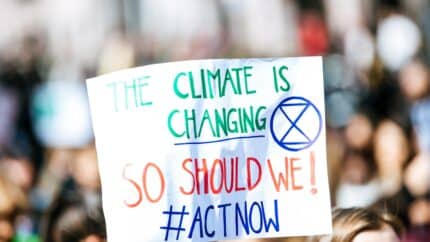Climate Change Crisis: Urgent Action Required to Save Planet Earth

The urgency of the climate change crisis cannot be overstated. The Earth’s climate is rapidly changing, and the consequences are already being felt around the world. From rising temperatures to melting ice caps, the effects of climate change are far-reaching and devastating. It is crucial that we understand the science behind climate change, the impact it is having on our planet, and the need for immediate action to mitigate its effects.
The Science Behind Climate Change: Understanding the Causes and Effects
At the heart of climate change is the greenhouse effect. The greenhouse effect is a natural process that occurs when certain gases in the Earth’s atmosphere trap heat from the sun, preventing it from escaping back into space. This process is essential for life on Earth, as it helps to maintain a stable temperature. However, human activities have significantly increased the concentration of greenhouse gases in the atmosphere, leading to an enhanced greenhouse effect and global warming.
The burning of fossil fuels, such as coal, oil, and natural gas, is one of the primary contributors to climate change. When these fuels are burned for energy, they release carbon dioxide (CO2) into the atmosphere. Deforestation also plays a significant role in climate change, as trees absorb CO2 and release oxygen through photosynthesis. When forests are cleared, this natural process is disrupted, leading to higher levels of CO2 in the atmosphere.
The effects of climate change are wide-ranging and severe. Rising temperatures are causing glaciers and ice caps to melt at an alarming rate, leading to rising sea levels. This not only threatens coastal communities but also exacerbates the frequency and severity of extreme weather events such as hurricanes and droughts. Additionally, climate change is disrupting ecosystems and biodiversity, leading to changes in migration patterns and habitat loss.
Breaking News: Extreme Weather Events on the Rise
In recent years, we have witnessed a significant increase in extreme weather events around the world. Hurricanes, wildfires, and droughts have become more frequent and more severe, causing widespread destruction and loss of life. These extreme weather events are directly linked to climate change.
Warmer ocean temperatures fuel the intensity of hurricanes, making them more destructive. The increased heat also leads to more evaporation, which in turn increases the amount of moisture in the atmosphere. This moisture can then be released as heavy rainfall, leading to flooding and landslides. Similarly, rising temperatures contribute to the severity and frequency of wildfires, as dry conditions make it easier for fires to spread.
Droughts are also becoming more common as a result of climate change. Higher temperatures increase evaporation rates, leading to drier soils and reduced water availability. This has devastating consequences for agriculture, food security, and access to clean drinking water.
The Impact of Climate Change on Biodiversity and Ecosystems
Climate change is not only affecting the physical environment but also having a profound impact on biodiversity and ecosystems. Changes in temperature and precipitation patterns are disrupting ecosystems and altering the distribution of plant and animal species. Many species are being forced to migrate to new areas in search of suitable habitats, while others are facing extinction due to habitat loss.
The loss of biodiversity has far-reaching consequences for ecosystems and the services they provide. Ecosystems play a crucial role in regulating climate, purifying air and water, pollinating crops, and providing food and resources for human populations. As species disappear or become displaced, these ecosystem services are compromised, leading to a decline in overall ecosystem health.
The long-term consequences of these changes are difficult to predict but could include the collapse of entire ecosystems, reduced agricultural productivity, and increased vulnerability to invasive species and diseases.
Breaking News: Rising Sea Levels Threaten Coastal Communities
One of the most visible and immediate impacts of climate change is the rise in sea levels. As glaciers and ice caps melt, water is added to the oceans, causing them to expand. This, combined with thermal expansion due to warmer temperatures, is leading to a steady rise in sea levels.
Coastal communities around the world are already feeling the effects of rising sea levels. Low-lying areas are at risk of flooding, and erosion is causing the loss of valuable coastal land. In some cases, entire communities may need to be relocated as their homes become uninhabitable.
The economic and social impacts of sea level rise are significant. Coastal infrastructure, such as roads, bridges, and buildings, is at risk of damage or destruction. Tourism, fishing, and other industries that rely on coastal resources may suffer. Displacement of communities can lead to social unrest and increased poverty.
The Role of Fossil Fuels in Climate Change and the Need for Renewable Energy
The burning of fossil fuels is a major contributor to climate change. When fossil fuels are burned for energy, they release greenhouse gases into the atmosphere, trapping heat and causing global warming. The continued reliance on fossil fuels is unsustainable and poses a significant threat to our planet.
To address climate change effectively, we need to transition away from fossil fuels and towards renewable energy sources. Wind, solar, hydroelectric, and geothermal power are all examples of clean energy sources that produce little to no greenhouse gas emissions.
Renewable energy not only helps to reduce greenhouse gas emissions but also offers numerous other benefits. It can create jobs, stimulate economic growth, improve air quality, and enhance energy security. Investing in renewable energy is not only good for the environment but also makes economic sense.
Breaking News: Climate Change Disproportionately Affects Marginalized Communities
Climate change does not affect everyone equally. Marginalized communities, including low-income populations, indigenous peoples, and people of color, are disproportionately affected by the impacts of climate change. These communities often have limited resources and face systemic barriers that make them more vulnerable to the effects of climate change.
For example, low-income communities may lack access to adequate housing, healthcare, and emergency services, making them more susceptible to extreme weather events. Indigenous peoples often have deep connections to the land and rely on traditional practices for their livelihoods. Climate change disrupts these practices and threatens their cultural heritage.
The social and economic impacts of climate change disparities are significant. Marginalized communities may face increased poverty, food insecurity, and displacement. The unequal distribution of resources and opportunities exacerbates existing inequalities and can lead to social unrest.
The Importance of International Cooperation in Addressing the Climate Crisis
Addressing the climate crisis requires global cooperation. Climate change is a global problem that transcends national boundaries, and no single country can solve it alone. International cooperation is essential for sharing resources, knowledge, and best practices.
By working together, countries can develop and implement effective strategies to reduce greenhouse gas emissions, adapt to the impacts of climate change, and support vulnerable communities. Cooperation can also help to mobilize financial resources for climate action and promote technology transfer to developing countries.
International agreements, such as the Paris Agreement, provide a framework for global cooperation on climate change. These agreements set targets for reducing greenhouse gas emissions and provide mechanisms for monitoring progress and holding countries accountable.
Breaking News: Urgent Action Needed to Prevent Irreversible Damage
The urgency of the climate change crisis cannot be overstated. If we fail to take immediate action, we risk irreversible damage to our planet and future generations. The consequences of inaction are severe and far-reaching.
Continued warming of the planet will lead to more frequent and intense heatwaves, droughts, floods, and storms. Rising sea levels will threaten coastal communities and ecosystems. Biodiversity loss will disrupt ecosystems and compromise vital ecosystem services. The social and economic impacts will be felt by all, but marginalized communities will bear the brunt of the burden.
To prevent irreversible damage, we must act now. We need to reduce greenhouse gas emissions, transition to renewable energy sources, protect and restore ecosystems, and support vulnerable communities. The time for action is now.
The Power of Individual Actions in Combating Climate Change
While the scale of the climate change crisis may seem overwhelming, individual actions can make a difference. By making simple changes in our daily lives, we can reduce our carbon footprint and contribute to the fight against climate change.
Reducing energy consumption is one of the most effective ways to combat climate change. This can be done by using energy-efficient appliances, insulating homes, and using public transportation or carpooling instead of driving alone. Supporting renewable energy by installing solar panels or purchasing green energy can also have a significant impact.
Individuals can also make a difference by advocating for climate action and supporting policies that promote sustainability. By raising awareness, engaging in dialogue, and voting for leaders who prioritize climate change, we can create a groundswell of support for meaningful action.
The urgency of the climate change crisis cannot be ignored. The science is clear, and the consequences are already being felt around the world. Rising temperatures, extreme weather events, biodiversity loss, and rising sea levels are just some of the impacts of climate change.
Immediate action is needed to mitigate these effects and prevent irreversible damage. Governments must take bold steps to reduce greenhouse gas emissions, transition to renewable energy sources, protect ecosystems, and support vulnerable communities. Individuals also have a role to play by reducing their carbon footprint and advocating for climate action.
The time for action is now. We cannot afford to wait any longer. The future of our planet and future generations depend on it. Let us come together and take the necessary steps to address the climate crisis before it’s too late.
Check out this fascinating article on ley lines and their connection to the climate change crisis. It delves into the hidden knowledge surrounding ley lines and why they are not widely discussed. Understanding ley lines could provide valuable insights into the urgent action required to save our planet. Read more about it here.
Leave A Reply
You must be logged in to post a comment.










 Paranormal
Paranormal

